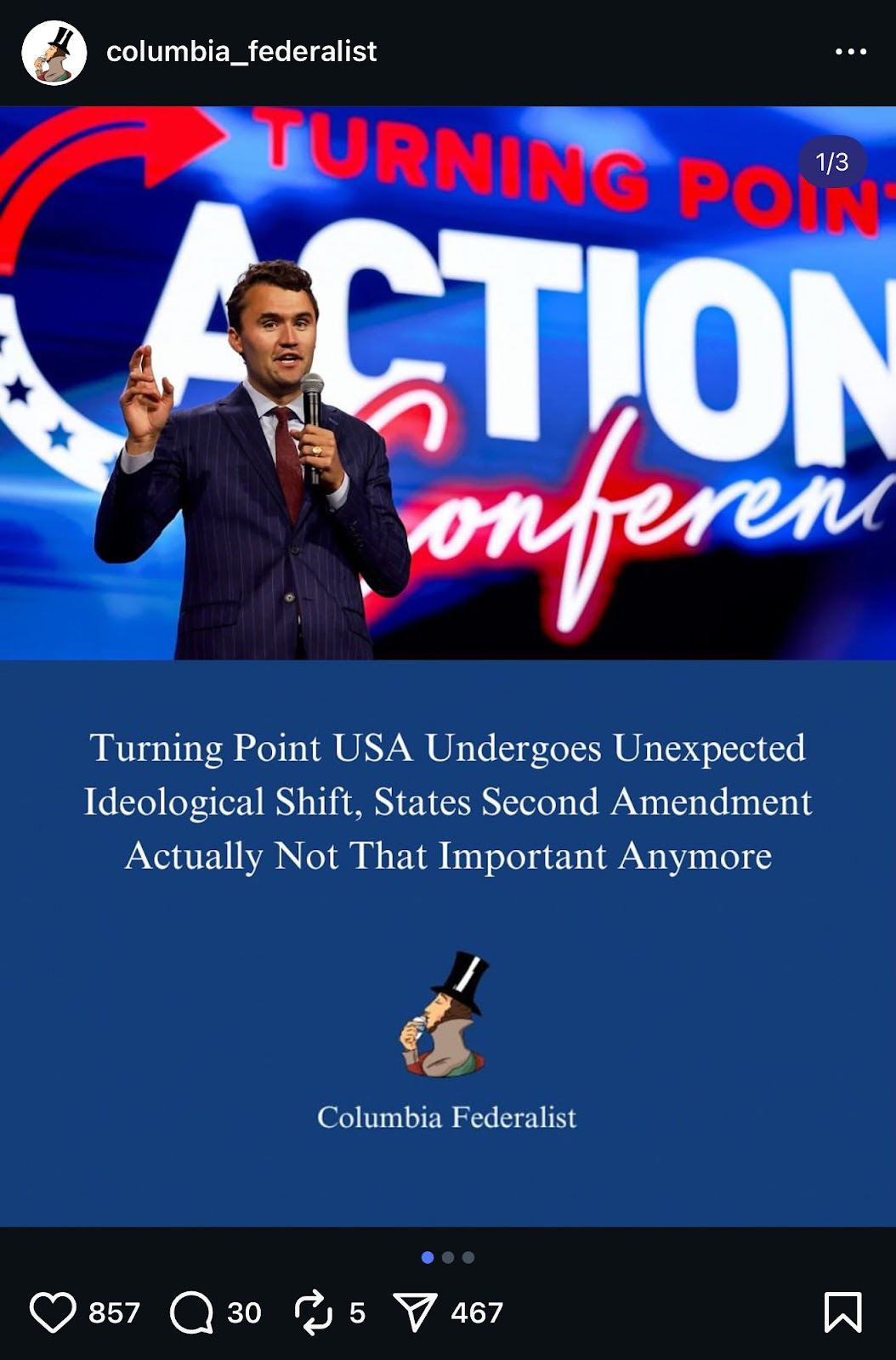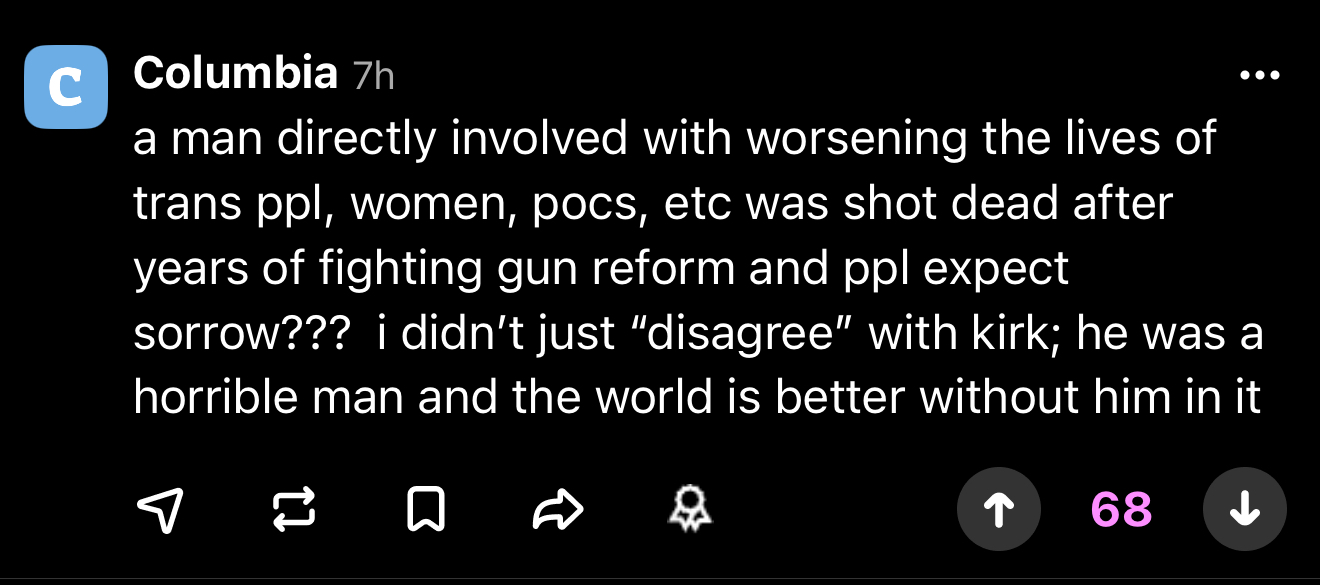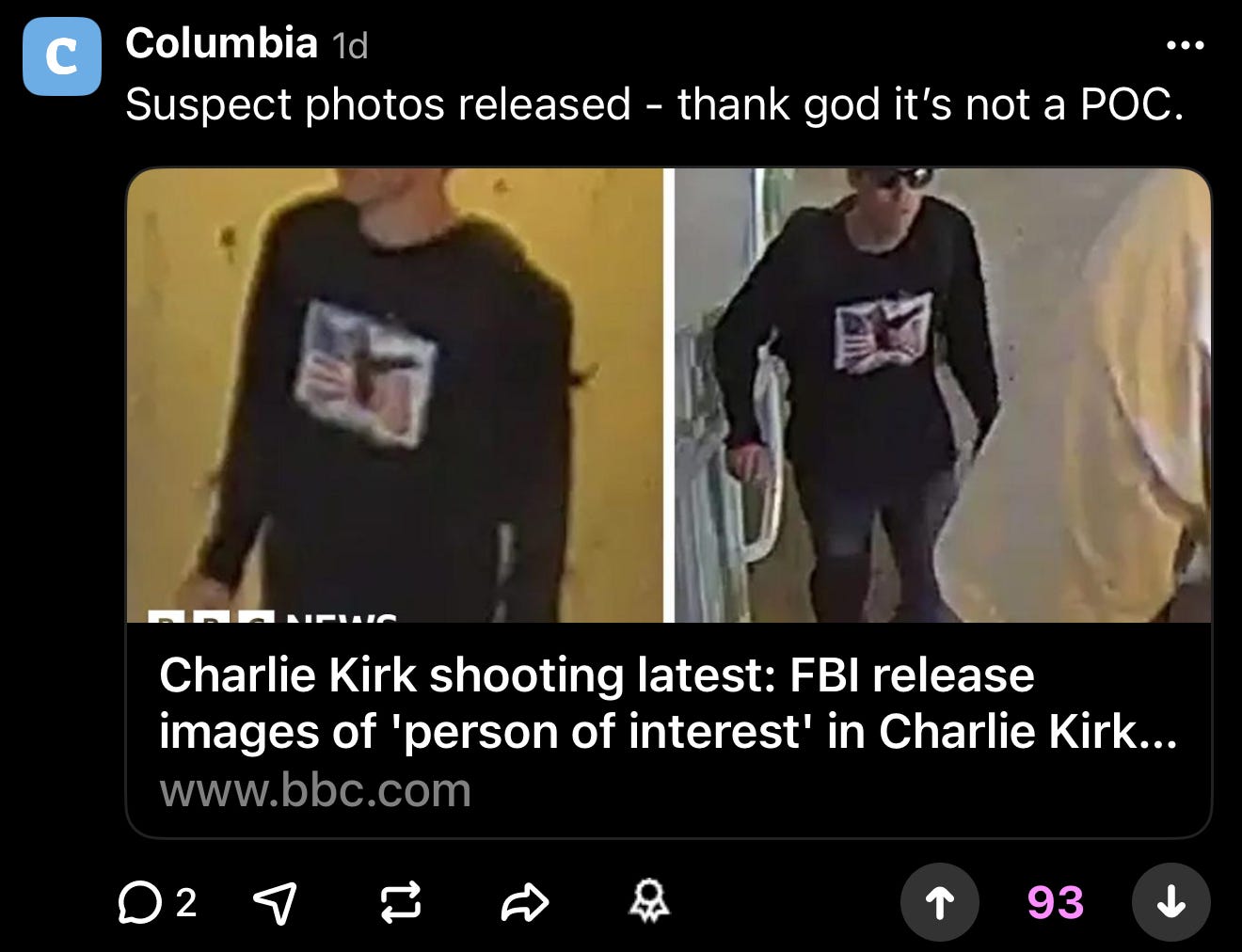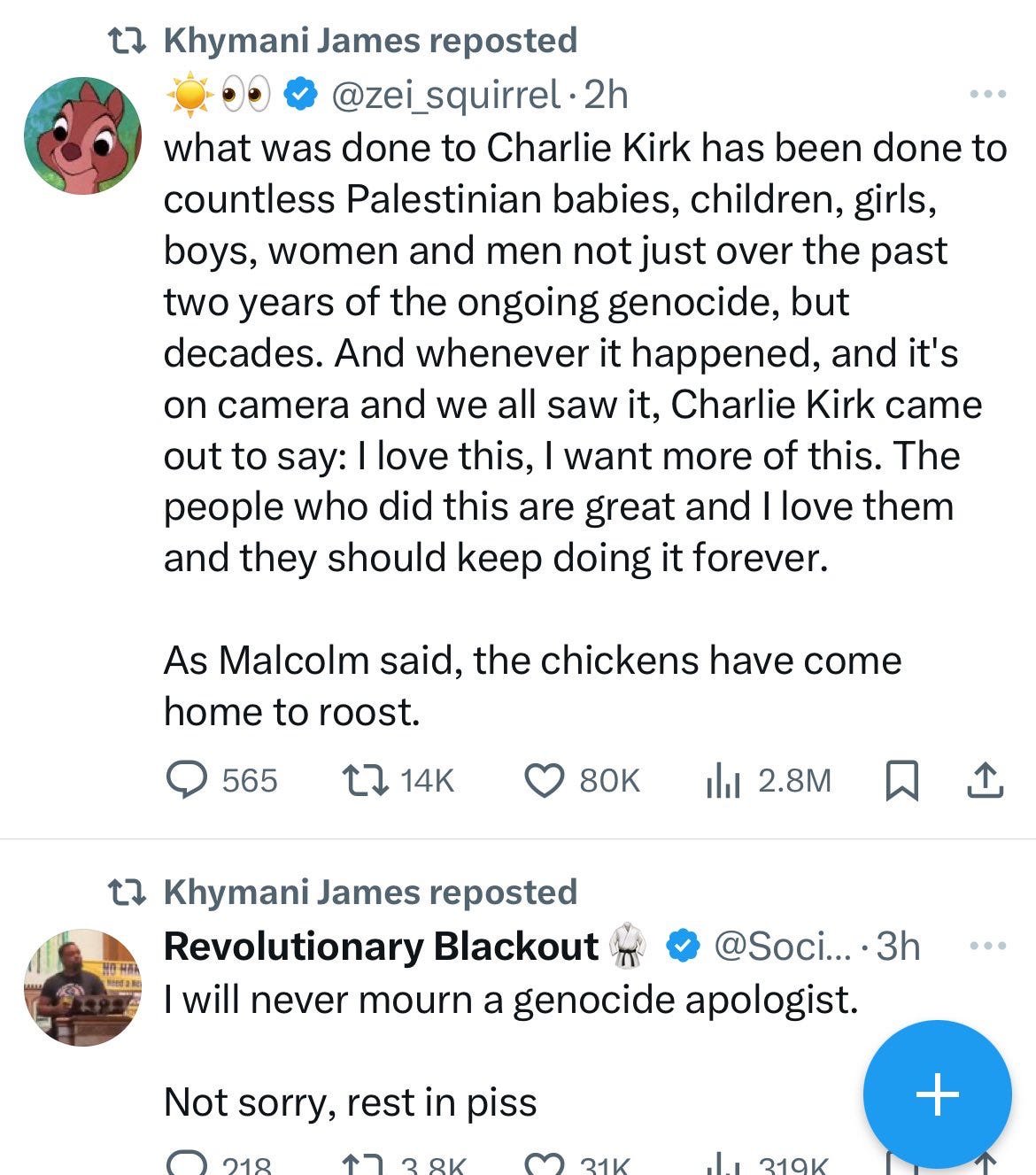Charlie Kirk’s Assassination Is Columbia’s Litmus Test
The conservative activist may have been contentious, but we can learn from his commitment to free speech.
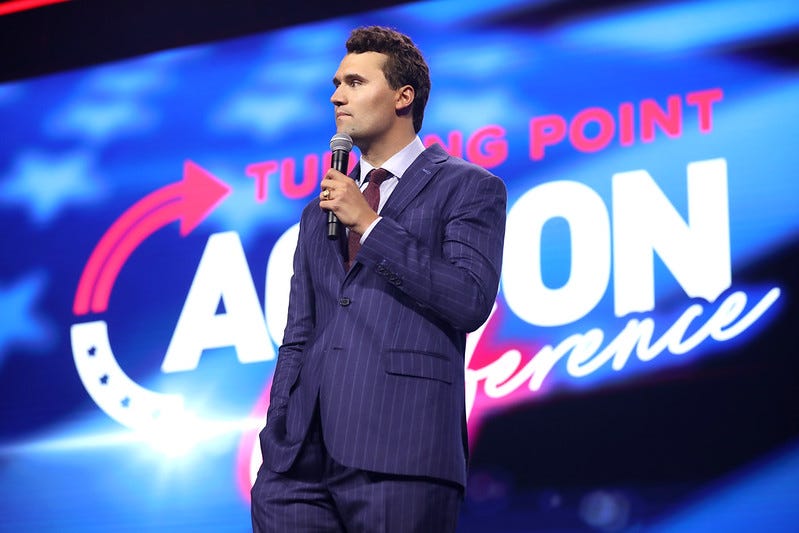
On Tuesday, the Foundation for Individual Rights and Expression (FIRE) published its 2026 College Free Speech Rankings. Barnard and Columbia now hold the unenviable distinction of America’s worst campuses for free speech. FIRE found that 26 percent of Columbia students and 33 percent of Barnard students believe that “using violence to stop someone from speaking on campus is acceptable, at least in rare cases.”
The next day, at approximately 12:23 p.m. MDT, conservative activist Charlie Kirk was fatally shot during a speaking engagement at Utah Valley University. Eyewitnesses described Kirk hemorrhaging onstage as students fled the scene. He was only 31. Kirk leaves behind his wife and their two young children, ages one and three.
The alleged assassin, Tyler Robinson, 22, was described by his mother as “a ‘genius’ when he got accepted into college.” Inscribed on Robinson’s bullets were the phrases, “Hey fascist! Catch!” and “bella ciao,” a slogan used during World War II to celebrate the killing of Nazis.
Through Turning Point USA (TPUSA), the organization he founded at the age of 18, Kirk pioneered a paradigm of unapologetic confrontation and grassroots organizing, rooted in the conviction that ideas—however unpopular or abrasive—belong in the public square. His approach was straightforward: show up, listen, speak candidly, and engage with ideological opponents. That, he insisted, was the essence of free speech—not consensus, but non-violent contestation.
Less than an hour after his death was confirmed, Columbia’s satirical publication The Federalist ran the headline: “Turning Point USA Undergoes Unexpected Ideological Shift, States Second Amendment Actually Not That Important Anymore.” We’re not here to clutch our pearls over humor, but let’s be honest: They wouldn’t dare lampoon the murder of a comparably polarizing liberal. To date, the post has 857 likes on Instagram, far surpassing engagement with their other content.
Those lauding Kirk’s death are, at the very least, a vocal minority on Columbia’s campus. Their reactions mirror the broader public discourse. Acclaimed novelist Stephen King initially celebrated Kirk’s assassination, claiming that he “advocated stoning gays to death.” MSNBC fired political analyst Matthew Dowd after he suggested that Kirk’s rhetoric warranted retribution.
On the anonymous college social media platform Sidechat, one student argued that since Kirk was “worsening the lives” of transgender people, women, and people of color, “the world is better without him in it.”
Another Columbia user declared that they were “desperately hoping this shooter is a straight white man” for fear of “retribution.” One recent comment reads, “Suspect photos released - thank god it’s not a POC.”
An additional comment reads that he “laundered the deaths of thousands of fathers, sons, husbands, wives, and children of people in Palestine.”
Absurdity aside, these accusations neglect Kirk’s efforts to foster dialogue between staunch isolationists and right-wing Zionists. At TPUSA’s Student Action Summit in July, Kirk moderated a debate between Dave Smith and Josh Hammer on U.S.-Israel relations. He also invited Tucker Carlson, an outspoken critic of Israel, and Scott Jennings, who consistently dons a yellow hostage pin, to speak. Such nuance is likely disregarded by those who view engagement with pro-Israel voices as complicity in genocide.
Khymani James, the former Columbia encampment leader infamous for declaring, “Be grateful that I’m not just going out and murdering Zionists,” took to X to praise Kirk’s murder and incite violence. On September 12, Columbia’s X account wrote that James “has been barred from Columbia’s campus since April 2024 and is not a registered student.”
This is what “free expression” has become at Columbia—not the defense of one’s ideas and mutual tolerance of others’, but an atmosphere where hostility is normalized and purportedly liberal students refuse to approach conservative, pro-Israel, and heterodox peers in good faith.
Their “logic” presumes guilt by association, condemning entire ideological spectra for extremists’ actions. Dialogue with the “wrong” side is construed as endorsement, resulting in self-perpetuating echo chambers that stymie debate.
This is by no means a unanimous position among liberals. As Ezra Klein noted in The New York Times, “You can dislike much of what Kirk believed and the following statement is still true: Kirk was practicing politics in exactly the right way.” And if it’s any consolation, most politically active students quickly denounced their extremist classmates’ flippancy.
Aum Desai CC ’28 and Co-President of the Columbia Open Discourse Alliance (CODA), told Sundial: “I am completely horrified and shocked. To live in a political climate where engaging in what I thought was the bedrock of American democracy can now be met with a deadly bullet is appalling. Even more so are some of our peers’ willingness to tolerate or even celebrate this behavior.”
Columbia, Desai asserts, “has an obligation to uphold institutional neutrality. Now more than ever, it’s important that the University fosters a political and social climate where all voices feel heard, respected, and valued, as only that will fundamentally restore the campus culture back to Columbia’s stated mission(s) of open debate and inquiry.”
Christina Ma BC ‘28, the founder and chair of Columbia’s newly-established TPUSA chapter, told us that, “Charlie Kirk was a man who valued discussion and open debate over violence” and that his example of civic dialogue is why she joined Columbia BridgeUSA (a multi-partisan student organization) as a conservative.
Ma maintains that, “What’s heartbreaking isn’t only the assassination but how people are reacting to it. The comments under the NYT post are heartless. The Federalist’s post is shameful. Some of my peers are posting on their social media openly to celebrate his death.” Ma believes that while Kirk’s assassination “can absolutely inspire conversations about gun violence, school shootings, and gun regulation, now is not the time to gloat.”
Across the aisle, Praharsha Gurram CC ‘27, a liberal student organizer, told Sundial that “the vast majority of Columbia students recognize that Charlie Kirk’s death is a dangerous and terrible thing, and know that democratic political discourse is impossible in the face of violence.” He added that “attempts to portray vast swaths of our campus as celebrating his death feel inaccurate to me, and only serve to heighten tensions at a particularly fraught moment for our country.”
Kirk’s assassination was, pun intended, a turning point. College campuses, once epicenters of democratic parley, are now incubators of hate. At Columbia, adolescent ire galvanizes combative protests. In Utah, it resulted in a bullet to the jugular.
In April 2025, Nikos published an op-ed in Sundial criticizing the White House’s crusade against pro-Palestinian activist and SIPA graduate Mahmoud Khalil. Nikos is an anti-war, open-minded leftist who holds some sympathies for the New Right. The following month, Shoshana co-wrote an exposé in Sundial on Khalil’s colleague Mohsen Mahdawi, arguing that Columbia students were overlooking his ties to terror. She is an ardent Zionist, foreign policy hawk, and self-proclaimed “disaffected Dem.”
The two of us seldom agree. Nevertheless, we share a mutual disdain for Kirk’s positions on abortion, gay marriage, and gun control. Neither of us anticipated writing an article defending his legacy.
To some, Kirk was a cultural icon and provocateur, and to others a caricature of MAGA’s rhetorical excess. Whether you loved or loathed him, he left an indelible mark on America’s political zeitgeist.
Charlie Kirk died doing what he did best: debating. He certainly did not represent the views of the average Columbia student, and that’s okay. As Kirk once said, “When people stop talking, really bad stuff starts. When marriages stop talking, divorce happens. When civilizations stop talking, civil war ensues. When you stop having a human connection with someone you disagree with, it becomes a lot easier to want to commit violence against that group. What we as a culture have to get back to is being able to have reasonable disagreement—where violence is not an option.”
Ms. Aufzien is a sophomore at Barnard College and the Jewish Theological Seminary. She is the Public Affairs Co-Chair of Columbia Aryeh and a 2025-26 Campus Transparency Fellow for The Fund for American Studies (TFAS).
Mr. Mohammadi is a sophomore at Columbia College. He is a co-president of Columbia Open Discourse Alliance (CODA) and a staff editor for Sundial.
The opinions expressed in this article are solely those of the authors and do not necessarily reflect the views of the Sundial editorial board as a whole or any other members of the staff.
For those interested in submitting a response to this article, please contact us at columbia.sundial@gmail.com.




